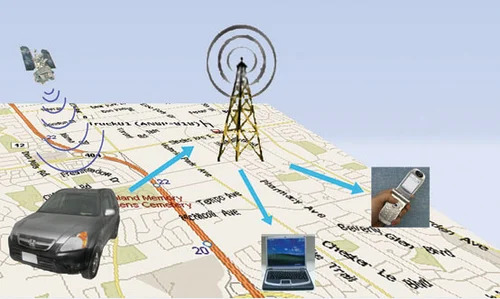In today’s fast-paced world, vehicle management has become more than just owning a car or fleet. Whether you’re a business handling logistics or an individual ensuring the safety of your vehicle, a GPS vehicle tracking system has become a necessity. This innovative technology allows real-time monitoring of vehicles, offering increased security, efficiency, and peace of mind. By using GPS satellites and advanced software, tracking systems provide precise location data, trip history, and driver behavior insights, making them a powerful tool for both personal and commercial use.
What is a GPS Vehicle Tracking System?
A GPS vehicle tracking system is a technology that uses the Global Positioning System (GPS) to determine the exact location of a vehicle in real time. This data is transmitted to a central server or mobile application through cellular networks, enabling users to monitor the vehicle’s movement and activities remotely.
These systems typically consist of:
- A GPS device installed in the vehicle.
- A tracking platform (web or mobile-based).
- Connectivity through GSM, 4G/5G, or satellite communication.
With these components, businesses and individuals can access detailed reports, including speed, routes, stops, and fuel consumption.
How Does a GPS Vehicle Tracking System Work?
The working of a GPS vehicle tracker involves three key steps:
- Signal Collection: The tracking device inside the vehicle receives signals from GPS satellites to calculate its position.
- Data Transmission: The location and activity data are sent to a central server using mobile networks.
- User Access: The data is processed and displayed on a web dashboard or mobile app for easy monitoring.
This real-time information is vital for decision-making, safety, and improving overall operational efficiency.
Benefits of a GPS Vehicle Tracking System
1. Enhanced Vehicle Security
One of the top reasons people invest in GPS vehicle tracking is security. If a vehicle is stolen, the real-time location helps in quick recovery. Some systems also provide geo-fencing, which alerts the owner if the vehicle leaves a designated area.
2. Better Fleet Management
For businesses managing a fleet, tracking systems streamline operations. Fleet managers can monitor driver activities, optimize routes, and reduce fuel costs, leading to significant savings.
3. Improved Driver Behavior Monitoring
With access to speed, harsh braking, and idle time reports, businesses can train drivers to improve road safety. This leads to fewer accidents and lower maintenance costs.
4. Cost Reduction
By optimizing fuel usage, reducing downtime, and improving route planning, GPS vehicle tracking systems help save operational costs. Businesses see a direct impact on profitability.
5. Peace of Mind for Individuals
Private vehicle owners can track the whereabouts of their cars, ensuring family safety. Parents often use trackers to monitor teenage drivers, adding an extra layer of security.
Key Features of a GPS Vehicle Tracking System
When choosing a system, look for these must-have features:
- Real-Time Tracking: Instant updates on the vehicle’s exact location.
- Route History: Complete logs of where the vehicle has been.
- Geo-Fencing: Alerts when the vehicle enters or exits a designated boundary.
- Speed Alerts: Notifications for overspeeding to ensure driver safety.
- Fuel Monitoring: Insight into fuel consumption and efficiency.
- Mobile App Access: Easy monitoring on the go.
- Driver Behavior Reports: Data on acceleration, braking, and idle times.
These features ensure you get maximum value from your GPS tracking investment.
Applications of GPS Vehicle Tracking System
Personal Use
- Locating stolen or misplaced vehicles.
- Monitoring teenage or elderly drivers.
- Ensuring family safety during travel.
Commercial Use
- Logistics and delivery companies can monitor fleets for timely deliveries.
- Taxi and ride-hailing businesses can ensure customer safety.
- Construction companies track heavy equipment usage and location.
- Public transport operators improve route efficiency.
Government and Law Enforcement
- Monitoring public buses and ensuring safety compliance.
- Tracking police and emergency vehicles for rapid response.
GPS Vehicle Tracking System for Businesses
For organizations, a vehicle tracking system is more than a tool—it’s an asset. It improves accountability, enhances customer satisfaction, and ensures regulatory compliance. With features like driver scorecards and maintenance reminders, companies can extend the life of their vehicles while reducing accidents.
Businesses that adopt GPS tracking often report:
- 20–25% savings on fuel.
- 15–20% improvement in driver productivity.
- Faster delivery times and better customer trust.
Choosing the Right GPS Vehicle Tracking System
When selecting a GPS tracking solution, consider the following factors:
- Accuracy: Ensure the system provides precise location tracking.
- Ease of Use: The platform or app should be user-friendly.
- Scalability: Businesses should choose systems that grow with their fleet.
- Support & Maintenance: Look for providers with reliable customer service.
- Cost-Effectiveness: Balance features with pricing to get the best value.
Future of GPS Vehicle Tracking Systems
With advancements in AI, IoT, and 5G, the future of GPS tracking looks promising. Modern systems will integrate with smart city infrastructure, providing predictive analytics, automated traffic management, and enhanced vehicle-to-vehicle communication. Businesses will also benefit from predictive maintenance alerts and AI-powered route optimization.
As electric vehicles (EVs) gain popularity, tracking systems will include battery monitoring and charging station integration, making them even more valuable.
Conclusion
The GPS vehicle tracking system is no longer a luxury but a necessity in today’s world. Whether you are an individual seeking peace of mind or a business aiming for efficiency, this technology provides unmatched benefits. From enhanced security to cost savings and better fleet management, the advantages are endless.
By choosing the right system with essential features like real-time tracking, geo-fencing, and driver monitoring, you can ensure your vehicles are always safe, efficient, and productive. As technology evolves, the role of GPS tracking in personal and commercial transportation will only grow stronger.





Comments